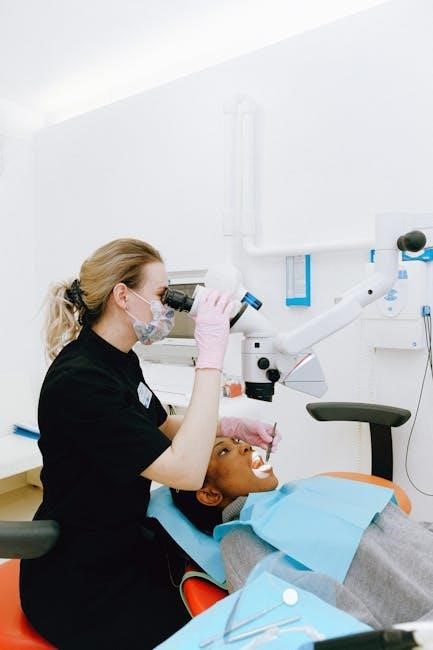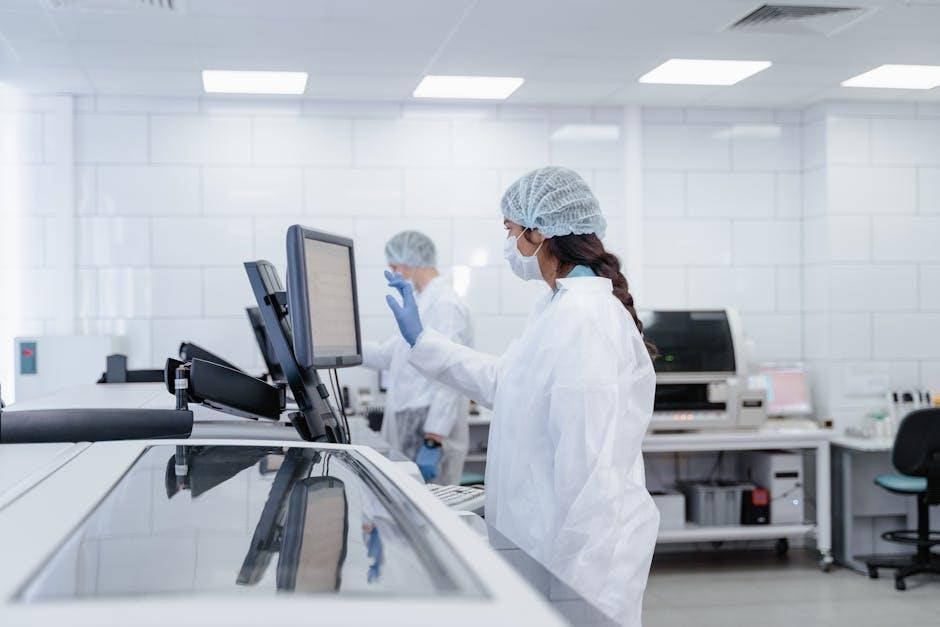
pharmacy tech practice exam pdf
The pharmacy technician practice exam is a valuable tool for candidates preparing for the PTCB exam. These interactive tests provide detailed explanations for each question‚ covering pharmacy law‚ pharmaceutical calculations‚ pharmacology‚ and pharmacy operations. They help identify knowledge gaps and improve study efficiency‚ ensuring readiness for the certification exam.
1.1 Overview of the PTCB and ExCPT Exams
The PTCB (Pharmacy Technician Certification Board) and ExCPT (Exam for the Certification of Pharmacy Technicians) are two prominent certification exams for pharmacy technicians. The PTCB exam focuses on knowledge of pharmacy law‚ calculations‚ pharmacology‚ and operations‚ while the ExCPT assesses skills in areas like drug safety and patient care. Both exams are essential for obtaining national certification‚ ensuring competence in pharmacy practice.
1.2 Importance of Practice Exams in Preparation
Practice exams play a crucial role in preparing for the pharmacy technician certification. They help reinforce knowledge‚ identify weak areas‚ and improve time management skills. By simulating real exam conditions‚ practice tests reduce anxiety and familiarize candidates with question formats. Detailed explanations for each answer enhance learning and ensure a comprehensive understanding of key concepts‚ boosting confidence and readiness for the actual exam.

Key Topics Covered in the Pharmacy Technician Practice Exam
The exam covers essential areas such as pharmacy law‚ pharmaceutical calculations‚ pharmacology‚ and pharmacy operations. These topics are critical for understanding the role and responsibilities of a certified pharmacy technician.
2.1 Pharmacy Law and Regulations
Pharmacy law and regulations are fundamental to ensuring legal and ethical practice. Topics include compliance with federal and state laws‚ HIPAA guidelines‚ controlled substance handling‚ and patient confidentiality. Understanding these legal frameworks is crucial for pharmacy technicians to operate within the bounds of the law and maintain patient trust. This section prepares candidates to navigate real-world scenarios effectively.
2.2 Pharmaceutical Calculations
Pharmaceutical calculations are essential for accurate medication preparation. Key topics include dosage calculations‚ concentration adjustments‚ and IV rate calculations. Practice exams help master unit conversions‚ percentage preparations‚ and formula applications. These skills ensure precise drug delivery‚ reducing errors and improving patient safety. Regular practice strengthens problem-solving abilities and builds confidence in handling complex mathematical challenges common in pharmacy settings.
2.3 Pharmacology and Drug Therapy
Pharmacology and drug therapy focus on understanding drug mechanisms‚ uses‚ and side effects. Practice exams cover top medications‚ therapeutic classes‚ and patient-specific regimens. They also address drug interactions‚ contraindications‚ and adverse effects. This knowledge helps technicians ensure safe and effective medication use‚ supporting pharmacists in patient care and improving therapeutic outcomes through accurate dispensing and counseling.
2.4 Pharmacy Operations and Management
Pharmacy operations and management cover essential tasks like inventory control‚ dispensing processes‚ and patient record handling. Practice exams test knowledge of workflow efficiency‚ safety protocols‚ and regulatory compliance. They also address communication skills and teamwork‚ ensuring technicians can effectively support pharmacists and deliver high-quality patient care while maintaining organized pharmacy systems and adhering to professional standards.

Best Resources for Pharmacy Technician Practice Exams
Top resources include free online PTCB practice tests‚ paid exam kits with detailed explanations‚ and recommended textbooks. These tools cover pharmacy law‚ calculations‚ pharmacology‚ and operations‚ ensuring comprehensive preparation for the certification exam and enhancing practical knowledge through real-world scenarios and interactive learning opportunities.
3.1 Free Online PTCB Practice Tests
Free online PTCB practice tests are an excellent starting point for exam preparation. These interactive tests include multiple-choice questions‚ detailed explanations‚ and cover topics like pharmacy law‚ calculations‚ and pharmacology. They simulate the actual exam experience‚ helping candidates identify knowledge gaps and improve their readiness. Many platforms offer short quizzes and full-length tests to enhance study efficiency and confidence.
3.2 Paid Practice Exam Kits and Guides
Premium PTCB practice exam kits offer comprehensive preparation tools‚ featuring hundreds of questions with detailed explanations. These guides are curated by experts‚ covering all exam domains‚ including pharmacy law‚ calculations‚ and pharmacology. Paid resources often include video/audio support and in-depth study materials‚ providing a thorough exam experience to enhance confidence and readiness for the certification test.
3.3 Recommended Textbooks and Study Materials
Essential textbooks like the Pharmacy Technician Practice Exam Kit and Pharmacy Technician: A Comprehensive Review are highly recommended. These resources‚ authored by instructors and industry experts‚ cover key topics such as pharmacy law‚ calculations‚ and pharmacology. They include practice questions and real-world examples‚ ensuring a robust understanding of pharmacy technician responsibilities and preparing candidates for certification exams effectively.

Strategies for Effective Exam Preparation
Effective exam preparation involves consistent study habits‚ active learning techniques‚ and utilizing recommended textbooks and online resources to ensure comprehensive understanding and readiness for the certification exam.
4.1 Time Management and Study Schedules
Effective preparation requires a structured study schedule‚ ensuring consistent review of all exam topics. Allocate specific times for each subject‚ balancing practice tests with theoretical study. Regularly assess progress and adjust your plan to focus on weaker areas‚ maintaining a steady pace to avoid burnout and ensure comprehensive readiness for the certification exam.
4.2 Focused Study on Weak Areas
Identify and prioritize weaker subjects using practice tests to pinpoint knowledge gaps. Dedicate extra study time to these areas‚ ensuring a deeper understanding. Focus on complex topics like pharmaceutical calculations or pharmacology‚ and review them systematically. This targeted approach enhances study efficiency and builds confidence‚ helping you master challenging sections before the exam.
4.3 Utilizing Practice Tests for Knowledge Assessment
Practice tests are essential for evaluating your understanding of pharmacy technician concepts. They provide detailed explanations for each question‚ helping you identify strengths and weaknesses. By simulating real exam conditions‚ these tests familiarize you with the format and timing‚ ensuring you’re well-prepared. Regular use of practice tests tracks your progress and improves overall knowledge retention for the certification exam.

Exam Format and Question Types
The pharmacy technician practice exam features multiple-choice questions and case studies‚ covering domains like pharmacy law and pharmaceutical calculations. Timed sections simulate real test conditions‚ assessing readiness.
5.1 Multiple-Choice Questions and Case Studies
The pharmacy technician practice exam includes multiple-choice questions and case studies‚ mirroring the real PTCB exam format. Questions cover pharmacy law‚ pharmaceutical calculations‚ pharmacology‚ and operations‚ with detailed explanations provided. Case studies simulate real-life scenarios‚ testing problem-solving skills and clinical application. These tools help candidates assess their knowledge‚ identify weak areas‚ and improve time management and exam readiness effectively.
5.2 Timing and Scoring System
The PTCB exam is timed‚ lasting 2 hours‚ and includes 90 multiple-choice questions. Each question is worth 1 point‚ with a maximum score of 90. The passing score is 1‚400 out of 1‚600‚ scaled to account for exam difficulty. Practice exams replicate this format‚ helping candidates adapt to time constraints and understand the scoring system for better exam preparedness and confidence.
Common Challenges and Solutions
Pharmacy technician candidates often face challenges like mastering pharmaceutical calculations and understanding complex drug information. Utilizing practice exams and focused study can help overcome these hurdles‚ ensuring better exam preparedness and confidence.
6.1 Difficulty with Pharmaceutical Calculations
Pharmaceutical calculations are a major challenge for many candidates due to complex formulas and unit conversions. Regular practice exams and review of dosage calculations can build confidence. Focused study on foundational math skills and using online resources with detailed explanations are effective strategies to master this critical area of pharmacy technician practice.
6.2 Understanding Complex Drug Information
Complex drug information‚ including side effects‚ interactions‚ and contraindications‚ can be overwhelming. Candidates should use practice tests to identify weak areas and review drug monographs. Focusing on the Top 200 Drugs and utilizing flashcards can enhance understanding‚ ensuring accurate patient care and safe medication handling in real-world pharmacy settings.
6.3 Managing Exam Anxiety
Exam anxiety can hinder performance‚ but proactive strategies can help. Regular practice tests‚ a structured study schedule‚ and relaxation techniques reduce stress. Understanding the exam format and timing through practice exams builds confidence. Focusing on weak areas and staying positive enhances readiness‚ ensuring a calm and focused mindset during the actual certification exam.

The Role of the Pharmacy Technician
A pharmacy technician assists pharmacists‚ manages prescriptions‚ and handles administrative tasks. They play a crucial role in patient care‚ ensuring accurate medication dispensing and maintaining efficient pharmacy operations.
7.1 Day-to-Day Responsibilities
Pharmacy technicians assist pharmacists‚ process prescriptions‚ and manage inventory. They handle patient data‚ prepare medications‚ and ensure accurate labeling. Daily tasks include answering patient queries‚ operating pharmacy software‚ and maintaining a clean‚ organized workspace. Technicians also collaborate with healthcare teams to support efficient pharmacy operations and patient care.
7.2 Contribution to Patient Care
Pharmacy technicians play a crucial role in patient care by accurately preparing medications and ensuring prescriptions are filled correctly. They assist pharmacists in counseling patients‚ addressing medication concerns‚ and providing health information. Technicians also help manage patient records and process insurance claims‚ contributing to efficient and personalized healthcare delivery.

Career Advancement Opportunities
Pharmacy technicians can advance to specialized roles like lead technician or shift supervisor. With additional certifications‚ they may transition into pharmacy management or pursue roles in healthcare administration.
8.1 Specialized Certifications
Pharmacy technicians can earn specialized certifications in areas like pharmacy operations or compounding. The PTCB offers advanced credentials‚ such as Certified Compounded Sterile Preparation Technician (CSPT) and Certified Pharmacy Technician (CPhT). These certifications demonstrate expertise and can lead to higher-paying roles or advanced responsibilities in clinical or administrative settings.
8.2 Continuing Education Requirements
Pharmacy technicians must complete continuing education to maintain certification. The PTCB requires 20 hours of CE every two years‚ with at least one hour in pharmacy law and one in patient safety. These requirements ensure technicians stay updated on industry changes‚ best practices‚ and advancements in patient care‚ fostering lifelong learning and professional competency.

Technological Innovations in Pharmacy Practice
Automation and electronic health records are transforming pharmacy operations‚ enhancing efficiency‚ and improving patient care. These innovations streamline tasks‚ reduce errors‚ and enable better data management and accessibility.
9.1 Automation in Pharmacies
Automation in pharmacies has revolutionized operations‚ with robotic dispensing systems and automated packaging reducing errors. These tools streamline tasks like filling prescriptions‚ minimizing human error‚ and improving efficiency. Automation also enhances patient safety by ensuring accurate medication dispensing‚ allowing pharmacy staff to focus on patient care and clinical responsibilities.
9.2 Use of Electronic Health Records
Electronic Health Records (EHRs) streamline pharmacy operations by storing patient data digitally. They improve accuracy‚ reduce medication errors‚ and enhance communication between healthcare providers. EHRs enable pharmacists to access patient histories‚ allergies‚ and prescriptions efficiently‚ supporting safer and more personalized care. They also facilitate tasks like prescription filling‚ insurance claims‚ and patient interaction tracking while maintaining confidentiality and regulatory compliance.

Final Tips for Success
Stay updated on pharmacy practices and consistently review study materials. Build a strong foundation in pharmaceutical calculations‚ laws‚ and drug therapy. Regularly utilize practice exams to assess readiness and refine strategies for exam success.
10.1 Staying Updated on Pharmacy Practices
Staying updated on pharmacy practices is crucial for success. Regularly review the top 200 drugs‚ pharmacy laws‚ and pharmaceutical calculations; Set aside time to explore new guidelines and advancements in pharmacy technology. Utilize online resources‚ practice tests‚ and study guides to stay informed and adapt to changes in the field‚ ensuring you are well-prepared for the exam and your future career.
10.2 Building a Strong Foundation in Pharmacy Knowledge
A strong foundation in pharmacy knowledge is essential for exam success. Focus on understanding key concepts such as pharmacy law‚ pharmacology‚ and pharmaceutical calculations. Use practice tests and study guides to reinforce learning. Regularly review notes and textbooks‚ ensuring mastery of core topics. Stay consistent and build confidence by tackling challenging areas methodically‚ laying a solid base for advanced preparation and real-world application.